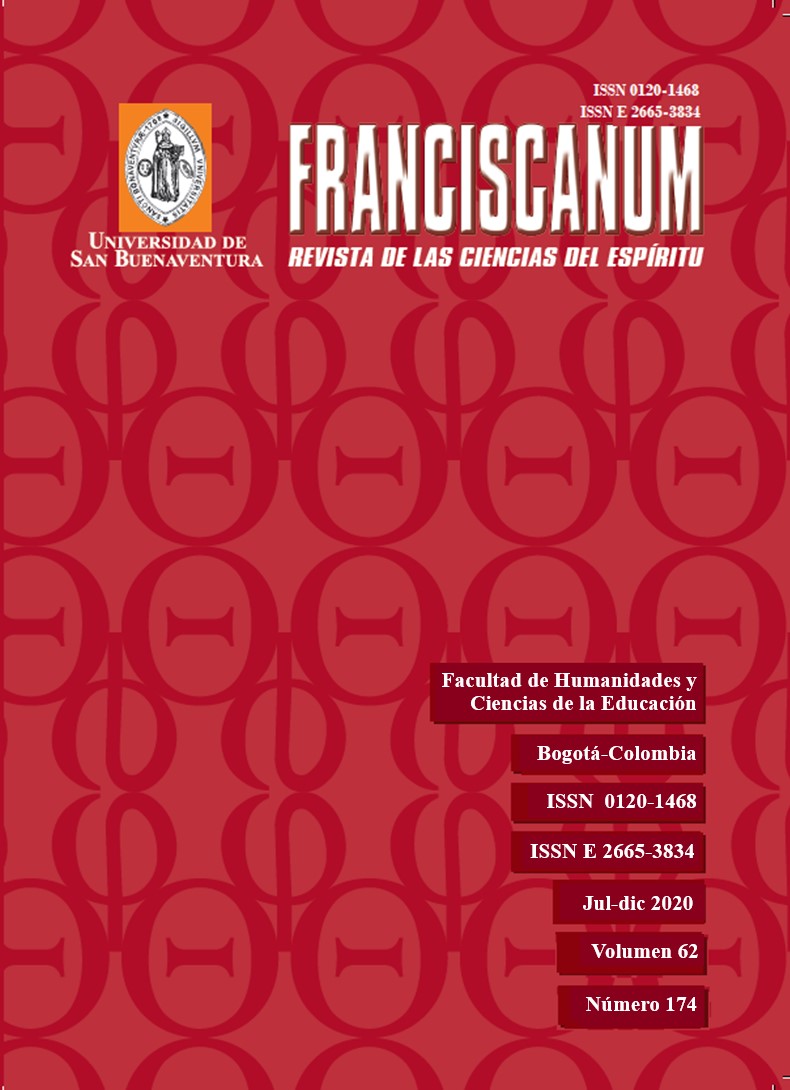This journal provides immediate open access to its content, based on the principle that giving the public free access to research helps a greater global exchange of knowledge.
Therefore, the Creative Commons 4.0 Attribution Attribution - Equal Share (by-sa) License is accepted: The commercial use of the work and the possible derived works is permitted, the distribution of which must be done with a license equal to that regulates the original work.
http://creativecommons.org/licenses/by-sa/4.0/
Along these same lines and in line with the Open Access policy, it is clarified that the authors maintain their rights to articles, without restrictions and, in the same way, they maintain their publication rights, without restrictions. They are only asked to reference the number of the Franciscanum magazine where the article initially appeared.
Abstract
In Levinas' unpublished lectures at the Collège philosophique, there is an analysis of the western conception of language because of a luminal paradigm of logical-conceptual relationship with being: a silent world that reveals itself in light. Phenomenology would not have been able to move away from traditional metaphysics, which encloses and dominates the being that is given in the light through reason, reducing it to the uniformity. Levinas finds in the sonority of sound a key to philosophical interpretation with the potential to design an alternative form of relationship with existence where otherness is expressed itself. Therefore, it is proposed the paradigm of sonority, as a refulgence, of the alternative being to that of light.
Keywords:
References
Calin, Rodolphe. Prefacio a Emmanuel Levinas. Escritos inéditos 2. Palabra y silencio y otros escritos. Traducido por Miguel García-Baró. Editado por Rodolphe Calin y Catherine Chalier, 13-36. Madrid: Trotta, 2015.
Castillo Becerra, Patricia. La fenomenología del segundo Levinas. Guanajuato: Universidad de Guanajuato, 2017.
Chalier, Catherine. «The voice and the book». En Making a Difference: Essays on the Bible and Judaism in Honor of Tamara Cohn Eskenazi. Editado por David J. A. Clines, Kent Harold Richards, Jacob L. Wright, 60-73. Sheffield: Sheffield Phoenix Press, 2012.
Chalier, Catherine. Prefacio a Emmanuel Levinas. Escritos inéditos 2. Palabra y silencio y otros escritos. Traducido por Miguel García-Baró. Editado por Rodolphe Calin y Catherine Chalier, 36-48 Madrid: Trotta, 2015.
De Greef, Jan. «Levinas et la phénoménologie». Revue de Métaphysique et de Morale 4, Vol. 76 (1971): 448-465.
Del Mastro, Cesare. «Filología y fenomenología de la vulnerabilidad: la metáfora en el pensamiento de Emmanuel Levinas». Lexis 2, Vol. 36 (2012): 291-332.
Esquirol, Joseph. «La primera palabra, o la esencia del lenguaje como amparo». Ágora. Papeles de Filosofía 1, Vol. 31 (2012): 103-120.
Heidegger, Martin. Ser y tiempo. Santiago de Chile: Editorial Universitaria, 1997.
Leconte, Mariana. «“Eso de lo que viven las palabras”: La significancia ética de la significación en Emmanuel Levinas», Philosophia: Anuario de Filosofía 2, Vol. 73 (2013): 83-95.
Levinas, Emmanuel. Escritos inéditos 1. Cuadernos del cautiverio, seguidos por Escritos sobre el cautiverio y Notas filosóficas diversas. Traducido por Miguel García-Baró. Editado por Rodolphe Calin y Catherine Chalier. Madrid: Trotta. 2013.
Levinas, Emmanuel. «Palabra y silencio». En Escritos inéditos 2. Palabra y silencio y otros escritos. Traducido por Miguel García-Baró. Editado por Rodolphe Calin y Catherine Chalier. 51-77. Madrid: Trotta, 2015.
Levinas, Emmanuel. «Poderes y origen». En Escritos inéditos 2. Palabra y silencio y otros escritos. Traducido por Miguel García-Baró. Editado por Rodolphe Calin y Catherine Chalier. 79-107. Madrid: Trotta, 2015.
Levinas, Emmanuel. «Los alimentos». En Escritos inéditos 2. Palabra y silencio y otros escritos. Traducido por Miguel García-Baró. Editado por Rodolphe Calin y Catherine Chalier. 109-121. Madrid: Trotta, 2015.
Levinas, Emmanuel. «Las enseñanzas». En Escritos inéditos 2. Palabra y silencio y otros escritos. Traducido por Miguel García-Baró. Editado por Rodolphe Calin y Catherine Chalier. 123-137. Madrid: Trotta, 2015.
Levinas, Emmanuel. «La separación». En Escritos inéditos 2. Palabra y silencio y otros escritos. Traducido por Miguel García-Baró. Editado por Rodolphe Calin y Catherine Chalier. 173-190- Madrid: Trotta, 2015.
Levinas, Emmanuel. De la existencia al existente. Traducido por P. Peñalver. Madrid: Arena Libros, 2000.
Levinas, Emmanuel. Descubriendo la existencia con Husserl y Heidegger. Traducido por M. Vázquez. Madrid: Síntesis, 2005.
Llorente, Jaime. «De fosforescencias que configuran mundos: Ser, alteridad y lenguaje en las conferencias inéditas de Levinas en el Collége philosophique». Ápeiron. Estudios de Filosofía 1 (2014): 207-41.
Llorente, Jaime. «Un diálogo antisocrático: enseñanza y lenguaje metafórico en los escritos inéditos de Emmanuel Levinas». Bajo Palabra. Revista de filosofía 10 (2015): 249-258.
Nietzsche, Friedrich. «La Gaya Scienza». En Friedrich Nietzsche vol. I. Traducido por G. Cuenca, 305-607. Barcelona: Gredos, 2010.
Pérez Espigares, Pablo. «Emmanuel Lévinas: ¿Por qué una metafísica “a-tea”? Una lectura de Totalidad e Infinito». Pensamiento 259, Vol. 69 (2013): 275-299.
Richter, Silvia. Language, Philosophy and Judaism in the Work of Emmanuel Levinas and Franz Rosenzweig, Inaugural. Diss. Dissertation. Heidelberg: Hochschule für Jüdische Studien Heidelberg, 2011.
Richter, Silvia. «Langage, son et voix dans les Carnets de captivité d’Emmanuel Levinas», Trajectoires, diciembre de 2014. Consultada en septiembre 17, 2019. http://journals.openedition.org/trajectoires/1459.
Urabayen, Julia. «Más allá de la onto-teología en el pensamiento de Levinas: del rostro a-Dios». Escritos 45, Vol. 20 (2012): 305-342.
Viola, Federico. «La reiteración del inicio. Aportes para una nueva concepción del tiempo a partir de la filosofía de Emmanuel Levinas», Franciscanum, vol. 58, no. 156 (2016): 119-143.



















